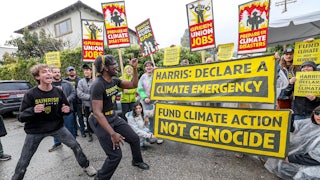Last week, to protest new oil and gas licensing, two members of the group Just Stop Oil sprayed Stonehenge orange. People got mad, demanding lengthy prison sentences for the activists, and, as has happened with previous protests, denouncing the tactics as ineffective and counterproductive. The irony is that Stonehenge faces a much greater threat than the temporary, cornstarch-based paint: The Conservative government—top brass of which have called the protest “disgraceful”—wants to build a road tunnel that could “compromise the integrity of this prehistoric landscape,” according to Unesco World Heritage Site officials.
But the discourse in the United States has been particularly frustrating. Tweeters and journalists alike have not only sidelined the tunnel threat to focus on whether Just Stop Oil’s actions are effective but have also suggested that these protests somehow discredit the climate movement as a whole.
Asking whether certain protest tactics are optimal misses the forest for the trees. Climate change is like any other issue in that it’s virtually impossible to entirely prevent suboptimal protests from happening. The nature of living through a chaotic, man-made transition to a new geological epoch is that people will, for good reason, freak out about it. (Given how dire the situation is, it’s remarkable that more people haven’t engaged in actual sabotage.) Address the reasons for people’s panic, and there will be less panic; fail to, and there will be more. Climate protesters spraying cherished objects aren’t the only ones who are scared. Lots of their critics, I’d argue, are freaked out too. Many are genuinely concerned about the havoc caused by the climate crisis.
This dynamic is visible in other debates right now too. For very good reason, a large segment of the U.S. population doesn’t want to see Donald Trump return to the White House. The factors propelling his campaign success, however—like recent inflation, rising rents, and outrageous health care costs, concerns about Biden’s age, and his administration’s support for Israel’s arguably genocidal war on Palestine—can seem almost impossible to change. For people who still basically believe in the ability of our country’s governing institutions to produce a good outcome, these factors are particularly maddening.
Many, accordingly, fixate on the counterarguments to these criticisms of the Biden White House, scrawling them week after week across X and opinion pages: Trump is old and slow too! Unemployment is historically low, and the economic indicators are up across the board! Don’t Biden’s critics know that Trump will be much, much worse on foreign policy?
None of this is wrong, per se. But yelling at Biden’s critics on the left isn’t good for much other than endearing yourself to his inner circle or, perhaps more importantly, cathartic release. Leftist critics won’t be the reason Biden loses, just like flashy, controversial protests won’t be the reason the world doesn’t limit global warming below two degrees Celsius (3.6 degrees Fahrenheit). Regrettably, the U.S. left doesn’t have enough power to influence presidential election outcomes much, one way or the other. And there are many reasons why adequate climate action has been extraordinarily difficult to come by here and abroad—the ubiquity and extraordinary political clout of the fossil fuel industry; a decades-long turn away from the sorts of economic planning that could help manage a holistic energy transition; the state’s overwhelming reliance on for-profit actors to deliver unprofitable public policy outcomes. To say that spraying Stonehenge orange is beside the point is an understatement.
Punching left has been a favorite elite liberal pastime for about as long as there have been elite liberals. Yet whatever libidinal energies are being loaded into their complaints about the left now don’t fully explain why so many of them are so enthusiastically attacking Biden’s critics online, or gloating that a candidate backed by Republican donors ousted a progressive Democratic incumbent.
Here’s my theory. Feeling unable to stop something awful from happening, people want to yell at something or someone they feel like they have control over. That the objects of that derision are relatively powerless—as compared to people who regularly publish their thoughts in The New York Times or The Washington Post—is kind of the point. At the risk of painting with too broad a brush: The left is propelled by a belief in both the need for deep, structural changes to our political and economic systems and the capacity of sufficiently organized people to make them. If instead, like some elite liberals, you wholeheartedly believe there is no deep rot at the heart of this country’s institutions, that nothing fundamental needs to change, or can, then the current moment—in terms of both global warming and Trump’s increasing chances of victory—must feel especially hopeless and infuriating.
Charitably speaking, then, the typically left-leaning climate activists disrupting sporting events and vandalizing world wonders aren’t so different from many of the liberals with big platforms who criticize them. Both are rightfully angry and dismayed about the objectively scary situation facing them. The difference is that the former are trying to do something about it, sometimes annoyingly. The latter seem resigned to the fact that nothing can be done and are lashing out accordingly.








